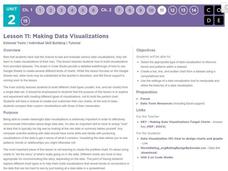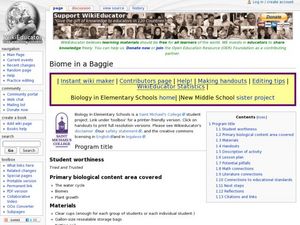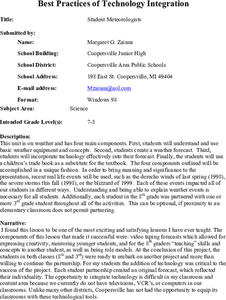PricewaterhouseCoopers
Conservation: Water
Here is a fantastic experiment-based lesson plan on water conservation, waste, and filtration. The lesson plan is well-developed and provides background information, discussion leads, and six scripted lab activities anyone can do. The...
PricewaterhouseCoopers
Waste and Recycling: Recycling and Energy Recovery
Reduce, reuse, recycle, and recover. Young environmentalists learn about the overwhelming amount of garbage produced and discover better ways to minimize their impact on Earth by learning the difference between garbage and recyclables.
Curated OER
Field Biology
Students work with 4th and 5th graders at Cascade Brook School in Farmington, to teach them skills in wildflower and fern identification, and then to help them implement a nature trail, which is accessible to the greater Farmington...
Curated OER
Can't Wait - Gotta Migrate:The Monarch Butterfly
Students study the migratory behavior of the monarch butterfly and to carefully develop a scientific method for answering one question concerning their behavior. They perform many meaningful tasks which help them explain the Monarch...
Royal Society of Chemistry
A Solid-Solid Reaction between Lead Nitrate and Potassium Iodide
Why is it so difficult to make two solid compounds react? Investigate the concepts of particle collisions and rate of reaction using a quick demonstration. The colorful experiment features two plain, white solids combining to form a...
Curated OER
Lotto or Life: What Are the Chances?
Though the website does not seem to have the mentioned video, a reding and lottery style games simulate the chances of finding intelligent life somewhere other than Earth. Without the video, this lesson is short, but it can be a useful...
Code.org
Making Data Visualizations
Relax ... now visualize the data. Introduce pupils to creating charts from a single data set. Using chart tools included in spreadsheet programs class members create data visualizations that display data. The activity encourages...
Curated OER
Student Meteorologists
Students examine and use basic weather equipment and concepts and create a weather forecast. They then incorporate technology effectively into their forecast. Students use a students's trade book as a substitute for the textbook.
Curated OER
Puberty
Eighth graders describe the changes their body undergoes during puberty. In this health science lesson, 8th graders explain how the hypothalamus and pituitary gland play a major role in the process. They identify the different parts of...
Curated OER
What Can I Do?
Students describe the things that citizens can do to reduce ground level ozone and particulate matter. They design a flyer, poster or webpage to teach others about diesel bus retrofitting projects.
Achievement Strategies
Unit/Chapter Design Template
A thorough lesson plan template allows teachers to design balanced and standards-based lessons for any grade. The template includes spaces for unit vocabulary and concepts, objectives, and additional resources.
Curated OER
Feeling Pressured
Students explore pressure in our atmosphere. They examine the relationship between pressure and depth. Students construct an experimental apparatus and take measurements. Students evaluate the impact of pressure on the lungs.
Curated OER
Reading Comprehension Worksheet: Compounds & Elements
In this reading comprehension worksheet, students read several short paragraphs about compounds and elements and then answer several questions about the text.
Curated OER
Ziplock Chemistry
Students investigate various chemical reactions when creating mixtures in ziplock baggies. In this chemistry lesson, students will recognize various chemical reactions and cite evidence. Safety and assessment strategies are included in...
Curated OER
Memorable Cell Membrane
Students investigate the components of a cell membrane. In this cell membrane lesson plan, students build a cell membrane model using toothpicks and candy to represent the parts of the membrane including the phospholipid bilayer and the...
Curated OER
Our Changing Community
Students investigate how communities grow and change. In this communities activity, students discuss how their community has changed and construct a model of a community.
Curated OER
Biomes and the water cycle
Students create a desert biome and a prairie biome and see how plants survive in both. In this biomes lesson plan, studnets create their biomes and see how the water cycle effect each biome and plant differently.
Curated OER
Student Meteorologists
Students complete a unit about weather and meteorology. They read the book "The Big Storm," use weather equipment, view local weather reports, and create a weather forecast that is videotaped and presented to a younger class.
Curated OER
Island Survival
Students participate in a simulation of life on a deserted island. They apply their critical thinking skills and knowledge of oceans and islands to "survive" and ultimately return to safety. Lesson contains adaptations for all levels.
Curated OER
Movement Across the Membrane (Diffusion)
Students investigate the concept of diffusion and how materials enter and leave a cell. In this movement across a membrane lesson plan, students use perfume, food coloring in water and a sugar cube in water to observe diffusion. They...
Curated OER
Pattern Detectives
Students discover patterns in language, math and science. They experience patterns by hearing stories, and becoming pattern detectives.
Curated OER
What Foods Contain Products from the Ocean
Fifth graders learn about foods from the ocean. In this ocean products lesson, 5th graders brainstorm what foods come from the ocean, fill in a Venn Diagram comparing alginates, carrageenans and beta carotenes. Students make a list of...
Curated OER
The Forecast Factory
Students role play weather forecasting activities. They investigate weather forecasting processes such as equations, data analysis, announcing by role playing in a large lecture hall.
Curated OER
Edible Wild Plants
Students explore the benefits of recognizing edible wild plants. For this wild plant lesson, students collect, make ready and eat edible plants. Students answer questions about the plants.

























